Another Part Of Abadan’s Collapsed Building Falls
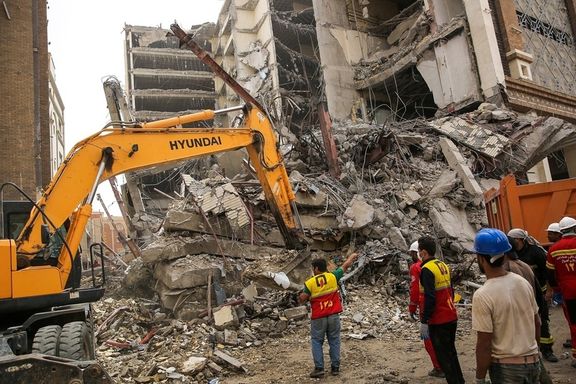
Another part of a building in the southwestern city of Abadan, whose collapse in May killed dozens and led to weeks of protests across Iran, fell down on Wednesday.

Another part of a building in the southwestern city of Abadan, whose collapse in May killed dozens and led to weeks of protests across Iran, fell down on Wednesday.
The remains of the Metropol building collapsed on Wednesday, burying an unknown number of workers. Iran’s Revolutionary Guard was responsible for cleaning the debris of the building.
Videos published on social media show a huge mass of dust arising from the collapsed building quickly covering the surrounding streets while several pedestrians and cars were trying to escape from that area. There is no immediate report about the precise amount of damage or casualties, but the city’s emergency service said at least one is dead and several are injured.
The Metropol twin towers collapsed on May 23, burying more than 80 people under the rubble, with 42 bodies recovered, an incident described by pundits as “a miniature symbol of the dynamics prevailing in Iran's government."
Soon after the collapse it became apparent that the owner and builder, Hossein Abdolbaghi, was a well-connected businessman who had disregarded regulations and building codes, backed by officials, who might have had their own financial interests.
Following the incident, Iranian media initially reported that Abdolbaghi, reportedly connected to Iran’s top security official Ali Shamkhani, had been arrested, but the government later announced he had died in the collapse. The public did not believe the claim and many said that he had escaped, with corrupt officials, who had allowed him to violate building regulations, wanted him to disappear.
In June, reports came out that a physician who refused to cooperate in the alleged coverup had died mysteriously.
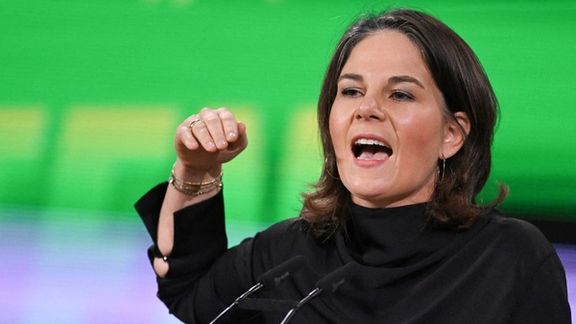
Germany is mulling over more restrictions for entry of individuals affiliated with the Islamic Republic beyond an already announced EU sanctions package over Tehran’s human rights violations.
Foreign Minister Annalena Baerbock said in a statement on Wednesday that in future, visas will be issued to holders of service and diplomatic passports only where absolutely necessary, and additional entry restrictions will be imposed on members of Iranian organizations listed by the European Union.
Noting that Berlin is adapting its relations with the Islamic Republic in accordance with the new developments, she said, "There can be no 'business as usual' in bilateral relations with a state that treats its own citizens with such contempt for human rights." She added, “Day by day, the regime acts more brutally” against antigovernment protests, ignited by the death of the 22-year-old Mahsa Amini in hijab police custody.
“We are suspending existing bilateral dialogue formats, critically reviewing the few remaining instruments in trade and financial relations and reducing the presence of cultural mediators working in Iran, '' she said.
“We are preparing further EU human rights sanctions and checking the listing of relatives of those responsible,” she added, calling for consequences for them.
She also said evidence must be collected on the Iranian regime’s atrocities, expressing support for a special human rights council and other NGOs in documenting the crimes.
Baerbock also promised protection programs for particularly vulnerable Iranians from the areas of culture, science, media and civil society
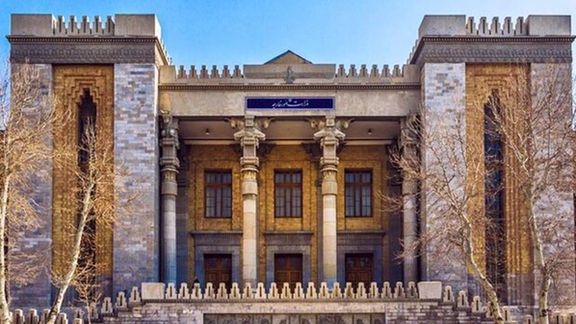
Iran has announced a new set of sanctions against institutions and individuals in the European Union, alleging that they incite violence in the country.
In a statement released on Wednesday, Iran’s Foreign Ministry again condemned the EU’s October 17 sanctions targeting Iranian individuals and entities over their role in the brutal suppression of peaceful protesters, calling the punitive measures a clear example of interference in Iran’s domestic affairs.
The ministry claimed that the Islamic Republic’s sanctions were imposed due to “deliberate actions in support of terrorism and terrorist groups, encouraging and inciting terrorism, violence, and hatred, which has caused riots, violence, terrorist acts, and human rights violations against the people of Iran.”
Iranian authorities, including the Supreme leader and the president, accuse Western countries and Israel of being behind the current wave of antigovernment protests, ignited by the death in custody of 22-year-old Mahsa Amini.
The new list of sanctions includes the Friends of Free Iran and the International Committee in Search of Justice (ISJ) and their members -- two informal groups in the European Parliament, in addition to Stop the Bomb, an organization advocating sanctions on Tehran with the stated goal of preventing it from acquiring nuclear weapons.
The Persian-language services of Germany’s Deutsche Welle and France’s RFI were also sanctioned, extending Iran’s animosity against foreign-based channels that it says are promoting an uprising such as BBC Persian and Iran International. Two directors of the German newspaper Bild were also blacklisted.
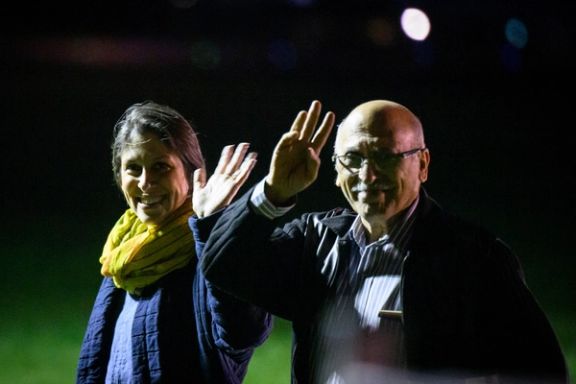
By Emma Batha Below we reprint an interview with former hostage in Iran, Nazanin Zaghari-Ratcliffe published on October 26 on the ongoing protests in Iran. Her insights shed more light on the prevailing situation.
---------------------------------------------------------------------------------------------------------------------------------------
Protests engulfing Iran have reached a point of "no return" as demonstrators demand wide reforms beyond the end of mandatory hijab rules, said British-Iranian charity worker Nazanin Zaghari-Ratcliffe, who spent six years detained in Tehran.
She said the Islamic government's crackdown on the popular revolt and shutdown of the internet showed it was scared of losing control.
"The anger has been building up for many, many years," said Zaghari-Ratcliffe as demonstrations raged for a sixth week, triggered by the death in police custody of 22-year-old Mahsa Amini after she was accused of wearing her headscarf improperly.

"We can see a coming together for one single goal, and that is freedom. The protests are really, really powerful this time. I don't think we've ever seen the unity we're seeing now," said Zaghari-Ratcliffe, describing Amini's death as the "spark for an explosion".
The protests have grown into one of the boldest challenges to the Islamic Republic since the 1979 revolution even if they do not appear close to toppling a government that has deployed its powerful security apparatus to quell the unrest.
"There is a generational shift which plays a massive role in the new movement," said Zaghari-Ratcliffe, who works for the Thomson Reuters Foundation as a project manager and will address the charity's annual Trust Conference on Wednesday.
"This is the generation of social media and TikTok and the internet. They know more about the world and their rights than we did. They have a lot more courage than we did."
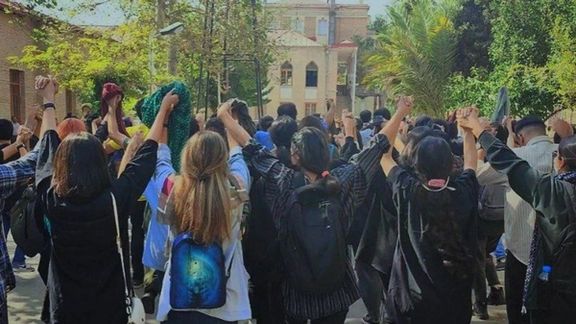
The uprising has seen women tear off and burn their veils, with crowds calling for the downfall of Supreme Leader Ayatollah Ali Khamenei.
Thousands have been detained by security forces and more than 200 killed including children, according to rights groups.
Solitary confinement
Zaghari-Ratcliffe, 43, was arrested at Tehran airport in 2016 after a trip to see her parents with her then 22-month-old daughter Gabriella.
She was separated from her daughter, whom she was still breastfeeding, and put in solitary confinement in a tiny windowless cell.
Zaghari-Ratcliffe was later convicted of plotting to overthrow the clerical establishment. She denied all the charges against her and the case was widely seen as political.
She was freed in March with another dual national, Anousheh Ashouri, after Britain repaid a historic debt to Tehran.
During her detention in Tehran's Evin prison, Zaghari-Ratcliffe said she met many women who had received long jail terms for protesting against Iran's mandatory hijab rule, including one 19-year-old sentenced to 24 years.
She said the current protests were a greater threat to the regime than previous ones because they had attracted broader support, with labour unions now organising strikes which could potentially paralyse the economy.
"There's no return from here," she said. "This is not just about forced hijab any more. It's also about the repressive rules they've been imposing on people for a very, very long time. It's about unemployment, it's about lifestyle, it's about freedom to have access to information and the internet."
Internet shutdowns
Iran has shut down the internet and blocked access to platforms such as Instagram and WhatsApp to stop people organising protests and sharing images with the outside world.
"Shutting down the internet is exactly what they are doing when they put people in solitary (confinement), only on a bigger scale," said Zaghari-Ratcliffe.
"They disconnect you from the outside world so the world doesn't know what is happening to you and you can't tell them. They want people to be scared and feel forgotten."
Zaghari-Ratcliffe said she would continue to speak up for other detainees, including UK-born environmentalist Morad Tahbaz who was expected to fly back to Britain with her in March but was kept behind at the last moment.
He was released on bail with an electronic tag in Tehran in July.
"My story is the story of many people in Iran who remain in prison. I've got the responsibility to be their voice," said Zaghari-Ratcliffe, adding that the protests made her proud to be an Iranian woman.
"It's a shame for those of us living in enforced exile that we cannot be with the women on the streets, but we are certainly very proud," she said.
Zaghari-Ratcliffe is settling back into London with her daughter and husband Richard, who ran a long campaign for her release including a three-week hunger strike while camped outside the Foreign and Commonwealth Office.
But she said she could not feel entirely free while friends were still in jail.
"Freedom is a very relative concept. I'm free in terms of coming out of prison and coming back home to my family in London. But I have left a part of me in Iran," she said.
"I won't be completely free until my country is free."
(Interview by Reuters)
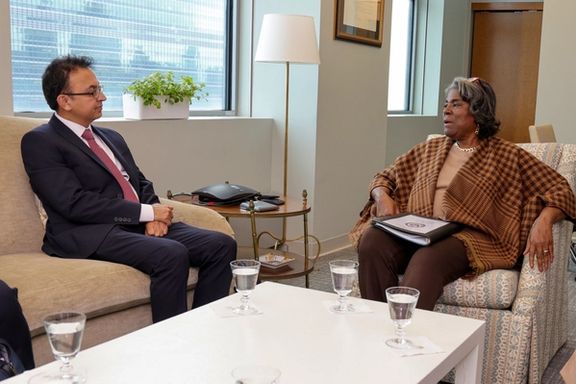
The United States is apparently pushing the United Nations to hold the Islamic Republic accountable for its violent crackdown on antigovernment protests.
During a meeting on Wednesday the US Ambassador to UN Linda Thomas-Greenfield and Javaid Rehman, the UN Special Rapporteur on the Human Rights Situation in Iran reiterated calls for an independent investigation to hold those responsible for the violence being carried out by the government of Iran accountable.
Appreciating the Special Rapporteur’s reporting on the human rights situation, the US ambassador especially thanked Rehman for his work to highlight Iran’s continuing repression of peaceful protesters and the rights of women and girls.
Ambassador Thomas-Greenfield repeated Washington’s stance that it will “continue to stand with the brave Iranian people as they call for equal rights and basic human dignity.”
Earlier this month, White House National Security Advisor Jake Sullivan said that the entire world is watching the current situation in Iran, reiterating that the United States stands with the Iranians.
Washington on October 6 imposed sanctions on seven Iranian officials over the shutdown of internet access and the crackdown on peaceful protesters. The EU is also putting significant pressure on Iran to stop Tehran from mistreatment of citizens.
Since the protests started over the death in custody of 22-year-old Mahsa Amini, several human rights bodies and NGOs have called on the international community to "support calls for the establishment of an independent international investigative and accountability mechanism to address the prevailing crisis of impunity in Iran."

As protests in Iran began in mid-September, the government blocked Instagram, the only international social media platform people were allowed to use.
Other platforms including Facebook, Twitter and Telegram were banned after the 2009 Presidential election and in the aftermath of the November 2019 protests.
Despite the bans, Iranian officials, including Supreme Leader Ali Khamenei are present on social media and some have more than one account on every platform. Other Iranians also continue to use social media apps by paying for VPNs [Virtual Private Networks] that allow them to circumvent the ban.
Social media has revolutionized the authoritarian information space in Iran. The government has lost its monopoly on information and desperately tries to control the Internet. Social media has become a town square where citizens gather to criticize and berate the clerical regime.
Abbas Abdi, a reformist pundit who is allowed to express mild criticism of the regime has written to urge the government to follow what people say on social media, because that is where most people are talking. Mentioning the fact that President Ebrahim Raisi has visited all of Iran’s 31 provinces to see how people live and hear their complaints, Abdi told the government in a social media post that they are missing the chance to hear the people in the “largest Iranian province” – social media.
He likened social media to an underprivileged province, saying, "Social media in Iran is like a province with a population of 50 million."
Abdi then reminded the government that "Around 75 percent of Iranians over the age of 18 years use at least one of social media platform, and there are others who simply use the Internet for searching or emailing." He added that "Some 64 percent of these people are on WhatsApp, 45 percent on Instagram, and 36 percent on Telegram."
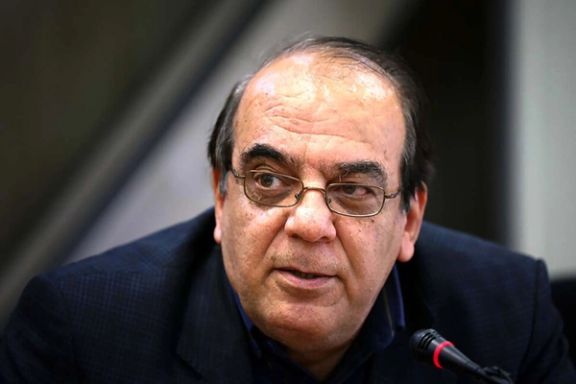
The commentator highlighted that "This is the statistics from six months ago. Currently, more people are using social media, 20 percent of them for business," and pointed out that the number of social media users is even higher among the youth” with 83 percent using apps for messaging, fun or business.
Abdi further reminded that many Iranians' livelihood depends on their presence on social media while the government has banned these platforms and created problems for many Iranians. He wrote: "The government's reason for blocking social media is that it says 90 percent of Internet content in Iran is under the control of the enemies…If 90 percent of those on social media are your enemies, then, whose government are you?"
Abdi then stated that "At least 20 percent of those on social media in Iran earn their daily” by ecommerce and he asked the government: "Do you know that you are preventing 10 million people from having an income? Do you understand that Iran is suffering from a 40-percent inflation rate? How should these people make a living?"
On 25 October, Iranian sociologist Hossein Abolhassan Tanhaei wrote in an article, which was also posted in a series of tweets, that the government's plan to give discriminatory access to the Internet to various groups of Iranians and prevent each group from accessing certain information "will lead to public anger by giving everyone a reason to believe they have been subject to discrimination."
Tanhaei wrote that currently, people have very little trust in the government and this feeling of discrimination will trigger public anger. Like Abdi, Tanhaei also noted that Iranians running their business on social media platforms will be affected by restricted access more than everyone else, and they will show the most serious reaction to the government's plan.
On 22 October, clerics at the Qom Seminary wrote a letter to Raisi demanding a permanent ban on WhatsApp, Instagram and Telegram. Meanwhile, according to reformist daily Arman Melli, the Friday prayer imam of Mashad Ahmad Alamolhoda, Raisi's father-in-law, also called for a ban on Instagram. This comes while, according to the head of Iran's passive defence organization Gholamreza Jalali, "Iranian officials have unrestricted access to Instagram."
According to Jalali, the final decision about the ban on social media will be made by the Supreme Council of National Security, which operates under the President to carry out direct orders coming from Khamenei. Even before the "final" decision is made, Behrouz Mohebbi, an Iranian lawmaker close to Khamenei's senior adviser Ali Larijani told Arman Melli on Monday that "The government will most certainly not lift the ban on WhatsApp and Instagram as these platforms are supervised by the enemies of the Islamic Republic."